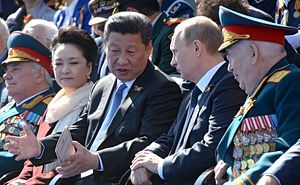As has been reported extensively in The Diplomat, China and Russia are increasing their military-to-military ties while simultaneously conducting a diplomatic offensive against U.S. security policies in East Asia and elsewhere. Most recently, Diplomat editor Shannon Tiezzi confirmed that China and Russia will conduct joint land and sea exercises in and around the South China Sea in September. While these developments are not indicative of a Sino-Russian security alliance reminiscent of the Sino-Soviet bloc of the 1950s, they nevertheless should cause U.S. policymakers to reflect on diplomatic and policy options for ensuring the preservation of U.S. security interests and a favorable balance of power in the region.
Geographically, Russia and China occupy respectively what classical geopoliticians called the “heartland” and a significant portion of the East Asian “rimland” of the Eurasian landmass. When Mao’s communists took control of the Chinese mainland in October 1949, and subsequently entered into a security alliance with the Soviet Union and its East European empire, geostrategists warned that such a conglomeration of territory and power could upset the global equilibrium. In the early 1950s, the great French writer Raymond Aron in his book The Century of Total War noted ominously that “Russia has in fact nearly achieved the ‘world island’ which [Halford] Mackinder considered the necessary and almost sufficient condition for universal empire.” Similarly, James Burnham in Containment or Liberation? warned that the political consolidation of the Sino-Soviet bloc would result in the communists “complete world victory.” The classified U.S. national security document that served as the doctrinal foundation for the Cold War containment policy—NSC-68—established Eurasian political pluralism as the overarching goal of American foreign policy.
The geopolitical threat posed by the Sino-Soviet bloc gradually receded when the Sino-Soviet split emerged and was successfully exploited by the Nixon administration with its famous “opening” to China. The current Sino-Russian rapprochement should concentrate the minds of U.S. policymakers on diplomacy designed to prevent a full-fledged Sino-Russian security alliance. A good start would be to reflect on the triangular diplomacy pursued by Nixon as explained by his national security advisor and Secretary of State Henry Kissinger.
“Triangular diplomacy, to be effective,” Kissinger explained in White House Years, the first volume of his memoirs, “must rely on the natural incentives and propensities of the players.” Kissinger explained that the opening to China and détente with the Soviet Union were pursued as parallel policies designed to enable the United States to “maintain closer relations with each side than they did with each other.” It was always better for the United States, he wrote in Years of Upheaval, “to be closer to either Moscow or Peking than either was to the other.” “America’s bargaining position,” he reiterated in his book Diplomacy, “would be strongest when America was closer to both communist giants than either was to the other.” In his most recent book World Order, he again noted that the design of triangular diplomacy was to balance “China against the Soviet Union from a position in which America was closer to each Communist giant than they were to each other.”
Triangular diplomacy avoided undue moralism. Kissinger, quoting Bismarck, wrote that “a sentimental policy knows no reciprocity.” “[P]redictability,” Kissinger continued, “is more crucial than … idiosyncratic moralistic rhetoric.”
Moreover, preserving a global balance of power does not lend itself to simple or permanent solutions. Instead, as Kissinger explained in White House Years:
[T]he management of a balance of power is a permanent undertaking, not an exertion that has a foreseeable end. To a great extent it is a psychological phenomenon; if an equality of power is perceived it will not be tested. Calculations must include potential as well as actual power, not only the possession of power but the will to bring it to bear. Management of the balance of power requires perseverance, subtlety, not a little courage, and above all understanding of its requirements.
This does not mean that the United States should accommodate Russian aggression in Ukraine or China’s aggressive moves in the South China and East China Seas. As Kissinger recalled in his memoirs, détente with the Soviets did not prevent Nixon from bombing Haiphong Harbor in North Vietnam, opposing Soviet designs in the Indo-Pakistan War, and ordering a nuclear alert to deter Soviet intervention in the 1973 Yom Kippur War. Nor did the opening to China forestall continued defense cooperation with Taiwan. Triangular diplomacy as practiced by Nixon and Kissinger did not mean abandoning U.S. security interests or shrinking from confrontation when those interests were challenged.
Eurasia is still the world’s dominant landmass, home to most of the world’s people and resources. The global balance of power still requires that no major power or alliance of powers controls the key power centers of Eurasia. For the United States, having better relations with China and Russia than either has with each other still makes sense in the post-Cold War world.
Francis P. Sempa is the author of Geopolitics: From the Cold War to the 21st Century and America’s Global Role: Essays and Reviews on National Security, Geopolitics and War. He has written on historical and foreign policy topics for Orbis, Strategic Review, Joint Force Quarterly, The University Bookman, the Asian Review of Books, the New York Journal of Books, Presidential Studies Quarterly, the Claremont Review of Books, American Diplomacy, The Diplomat, and the Washington Times. He is an attorney, an adjunct professor of political science at Wilkes University, and a contributing editor to American Diplomacy.

































